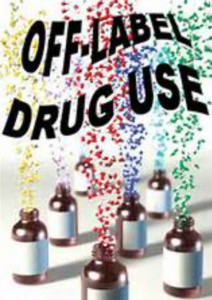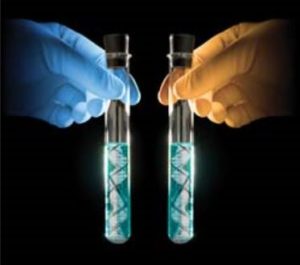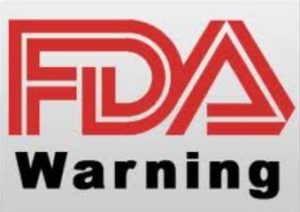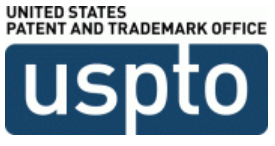- FDA to hold long-awaited meeting to review off-label marketing (statnews.com)
After years of anticipation, the Food and Drug Administration will hold a public, two-day meeting in November to review the extent to which so-called off-label information about medicines may be disseminated to physicians...the FDA has taken a firm stance toward the issue. A key concern is that public health could be jeopardized if a company were to distribute information about an unapproved use that had not been proven to be safe and effective, a standard for regulatory approval...drug makers have argued that conveying certain types of information is protected by the First Amendment...drug makers and their supporters have grown impatient and fear that various court rulings might become a de facto standard. Last winter, an independent review panel was floated as a way to address the issue. Last May, two lawmakers accused the Department of Health and Human Services of delaying new rules and issued a draft bill that would allow companies to market products for unapproved uses...
- Biosimilar names may affect pharmacist dispensing habits (statnews.com)
A newly released survey suggests variations in how biosimilars are named may affect the willingness of pharmacists to substitute a so-called interchangeable biosimilar for a more expensive biologic. While a biosimilar is supposed to be highly similar to a biologic, interchangeability confers a higher threshold — it’s a distinct regulatory description for a biosimilar producing the very same clinical result as a biologic...So far, the US Food and Drug Administration has approved just two biosimilars, although neither is deemed interchangeable with a brand-name biologic. There is ongoing debate, meanwhile, about the extent to which the names given to any and all biosimilars will make it harder to track side effects, or confuse doctors and pharmacists, some of whom may regard these new drugs with skepticism...nearly 20 states have so far passed laws that allow pharmacists to substitute an interchangeable biosimilar for a brand-name biologic without the prescribing physician intervening..."Pharmacists are a last line of defense — they either recommend a product or discourage its use," said Daniel Tomaszewski, the study author, who is a pharmacist..."If pharmacists are less confident or uncomfortable, it could reduce the use or uptake of a product, because they can affect the view the general public has toward a product."
- Drugmakers Split on Whether to Include Interchangeability Statement in Biosimilar Labels (raps.org)
Drug, biologic and biosimilar companies’ comments on Food and Drug Administration draft guidance on biosimilar labeling reveals a major split between those who do and do not want a statement on a biosimilar’s interchangeability status on each new product's label...FDA has still yet to release its guidance on what interchangeability means, and as FDA has not found any biosimilar to be interchangeable with its reference product…
- Amgen says it...believes a biosimilar label should include a summary of the clinical data, including immunogenicity data, used to demonstrate biosimilarity or interchangeability…
- Pfizer said...biosimilars should not be labeled "as though they were small molecule generic drugs" and that it "recommends that biosimilar labeling include a statement reflecting whether interchangeability has been assessed."
- Merck & Co...says "that a single blanket approach applicable to all biosimilar products is not appropriate, and may cause unnecessary confusion among stakeholders."...recommends that rather than using such blanket statements, FDA take a risk-based approach for each biosimilar…
- Boehringer Ingelheim says that it "does not agree that a biosimilar label needs to include a ‘biosimilarity statement,’...Such information is not ‘essential scientific information needed by health care practitioners for the safe and effective use of a drug.’
- Sandoz...says... "It is self-evident that the very act of highlighting the indications that are extrapolated is being proposed by some groups in order to raise doubts as to the safety and efficacy of the biosimilar for those indications, and perhaps to also imply inferiority of biosimilars across the board.
- India’s Drug Approvals Near Record Despite FDA Inspection Blitz (bloomberg.com)
The U.S. Food and Drug Administration has become something of a bogeyman for India’s stock market...An inspection blitz on Indian drug factories that supply to the U.S. helped push the broader index of Indian health-care stocks down by as much as 20 percent earlier this year from its all-time high in 2015 after some top firms received warning letters for failing to meet the regulator’s standards...But even as the FDA has increased scrutiny of India, it’s been approving generic drug applications from the country’s firms at a record pace...Everything sounds negative around Indian pharma, but practically it’s just a few companies...India’s growing importance in the U.S. supply of generic medicines -- India Ratings & Research estimates it accounted for 31 percent of all new drug approvals last year -- prompted the FDA to increase its workforce in the country to 19 from 12 in recent years...
- Drug firms continue to abuse citizen petitions, FDA tells Congress (statnews.com)
...the US Food and Drug Administration filed an annual report to Congress about citizen's petitions that can be used to ask the agency to refrain from approving a generic drug or a biosimilar...FDA officials reiterated complaints that many petitions generally do not raise valid scientific concerns and appear to have been filed to delay approval of competing medicines...Congress...requires the FDA to respond to most petitions within 150 days. And as far as the FDA is concerned, this creates an unnecessary problem...agency officials are concerned that most petitions are merely a competitive ruse, and they wrote Congress that they are forced to redirect efforts at the expense of completing the other work of the agency...The concerns expressed by FDA officials largely mirror a forthcoming analysis...The analysis found that brand-name drug makers filed 92 percent of such citizen petitions between 2011 and 2015...Citizen petitions represent a hidden tool in (the brand-name drug maker's) toolkit of entry-delaying activity, all to the detriment of consumers forced to pay high drug prices...the analysis concludes.
- FDA warns Chinese drug maker over lying (statnews.com)
The next time that employees at Xiamen Origin Biotech want to lie to regulators about what they are doing, they may want to make sure that the doors to nearby rooms are closed...During an inspection last January of its facilities in the southeastern Chinese province of Fujian, an employee told a US Food and Drug Administration inspector that the company did not keep any drugs on location. But while they reviewed company operations in a conference room, the inspector happened to notice that an adjacent room was being used to warehouse relabeled medicines...The same Xiamen employee also thought nothing of telling the inspector that the company had stopped relabeling drugs in January 2015. But during the inspection, the FDA staffer reviewed a list of exported drugs that showed Xiamen had distributed them until January 2016...Pharmaceutical and ingredients manufacturers in China and India have come under intense scrutiny in recent years due to a series of disturbing events...the flow of FDA warning letters about companies based in these countries receives added attention, sometimes deservedly so. Xiamen, for instance, also lied to its customers, according to the FDA...The company falsified and omitted information on certificates of analysis...which are supposed to verify the veracity of its products...
- FDA enhances warnings on group of strong antibiotics (reuters.com)FDA updates warnings for fluoroquinolone antibiotics (fda.gov)
The...Food and Drug Administration has enhanced warnings of side effects of a group of strong antibiotics used to treat a variety of respiratory and urinary tract infections and limited their use to patients with no alternatives...fluoroquinolones include Johnson & Johnson's Levaquin, Bayer's Cipro extended-release tablets and Merck Inc's Avelox....FDA added a box warning to the antibiotics in July 2008 to inform users about the increased risk of tendinitis in which the tissue connecting muscle to bone becomes inflamed.
- Patents vs. Market Exclusivity: Why Does it Take so Long to Bring Generics to Market? (raps.org)
It’s well known that generic drugs are just as safe and effective as their brand name counterparts. They’re the cheap knockoffs that help more people around the world gain access to innovative and sometimes life-saving treatments; the boring copycats made by companies you’ve never heard of and sold in plain bottles with little fanfare...what’s constraining the dissemination of these small molecule generics...isn’t the Food and Drug Administration and the backlog of abbreviated new drug applications, but a patent and market exclusivity system that can reward pharmaceutical companies long after they’ve recouped their research and development expenses and, at times, hefty profits…Patents and exclusivity work in a similar fashion but are distinctly different from one another. Patents are granted by the patent and trademark office...and can encompass a wide range of claims. Exclusivity is exclusive marketing rights granted by the FDA upon approval of a drug and can run concurrently with a patent or not. Exclusivity is a statutory provision and is granted to an NDA [new drug application] applicant...Exclusivity was designed to promote a balance between new drug innovation and generic drug competition...
- The FDA just greenlit releasing mutant Zika-killing mosquitoes in Florida (fusion.net)Spraying Begins in Miami to Combat the Zika Virus (nytimes.com)Zika in the United States, explained in 9 maps (vox.com)
...the Food and Drug Administration gave the okay to a field trial that would release genetically modified Zika-killing mosquitoes in the Florida Keys...the FDA released a final environmental assessment of the trial, finding that it “will not have significant impacts on the environment.” The project, led by Oxitec, a biotech company that focuses on insect control, calls for the release of thousands of genetically engineered male Aedes aegypti mosquitoes. The lab insects are bred so that over time they could kill off much of the local mosquito population by passing on a gene fatal to any offspring they have with wild females...The FDA’s okay is a major step forward toward a U.S. implementation of the technology at a time of much concern over the spread of Zika in the U.S. after cases in Florida...
- Facing Cancer Drug Shortage, U.S. Relies on Banned Chinese Plant (bloomberg.com)
Last September, U.S. regulators faced a dilemma: whether to allow importation of drug ingredients from a Chinese factory (Zhejiang Hisun Pharmaceutical Co.) with a history of poor quality controls, or face shortages of treatments for American cancer patients...Food and Drug Administration inspectors had uncovered what the agency later called “broad data manipulation” at the factory, located in Taizhou....Information about the potency and purity of some product batches had been deleted, making it difficult to investigate a significant increase in customer complaints...The agency issued an indefinite ban on the factory...one of China’s leading exporters of pharmaceuticals products. Yet to avoid possible shortages of drugs, the FDA allowed the plant continue exporting about 15 ingredients for use in finished drugs in the U.S., including nine key cancer medicine components. Hisun says that it takes quality seriously and has complied with requirements.









